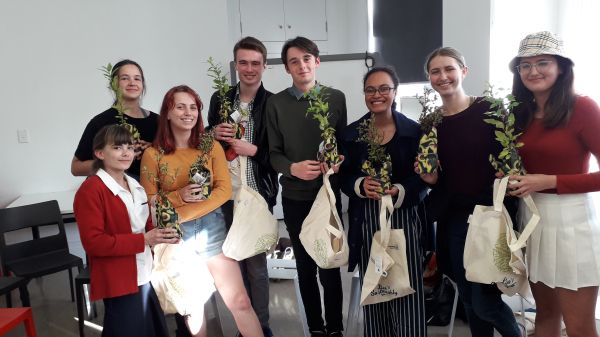What Do our Student Climate Strikers Want?

Interest in the climate emergency is growing in New Zealand, where a Zero Carbon Act was passed into law in November but otherwise seems to be little tangible progress made towards the goal of net carbon zero. In line with this movement, New Zealand secondary students held their third climate strike of 2019 on September 27th. Adults joined them, and it was estimated that over 170,000 people, or 3.5% of New Zealand’s population, took part in a climate strike on that day. This percentage is significant given that, according to Harvard University political scientist Erica Chenoweth’s research, if 3.5% of the population actively participate in protests such as this, then serious political change can occur.
The Auckland branch members of the New Zealand Association for Environmental Education were interested in hearing what these student climate strikers wanted from their teachers and other adults, and why they are so passionate about the climate emergency. To explore these questions, we invited the leaders of Auckland’s School Strike 4 Climate to take part in a panel discussion, along with teachers and the public for a fruitful a discussion.
Eight secondary students offered to share their views, and around 30 adults attended, including secondary teachers. There were no set questions; instead each student spoke about how they felt about the climate emergency and what they wanted from their teachers. During the discussion, the students also talked their opinions about what was happening in society and what they would like to see from the education system.

Our students think that adults are not listening and politicians are dodging their questions about climate change education. They feel that the system is letting them down and that politics are holding up changes that need to be made. Even though they acknowledged that individual actions do help, they feel that individual action is prioritised over systemic change.
These students want climate change education for everyone, even young children, because all children of all ages deserve to know. They do not want to be left to teach themselves, since they feel that they are the generation that will lead us through the coming disruptions and devastation. However, at present, they find that climate change education in secondary schools is sporadic. When it is part of the curriculum, climate change education seems to depend on the initiative of individual teachers, is only taught in environmental studies, or is taught only for brief periods of time. One student noted that climate change education has been put in the corner for the eco-kids.
Our students want climate change education to be integrated into every subject at all levels of formal education. As New Zealand is a bi-cultural society, they also want Maori worldviews of the climate emergency to be incorporated. As Auckland has the largest number of Pasifika people in the world, and with the Pacific Islands at ground zero of the climate emergency, these students want Pasifika worldviews included as well.
Towards the end of the discussion, students were asked to identify what they want climate change education to look like. They requested:
- Teachers who know how and what to teach about the climate emergency;
- That IPCC reports be made accessible, as they find the technical language difficult to understand;
- Quality resources, for them and their teachers, that are both age appropriate and culturally appropriate;
- To learn about action-taking skills that will bring about systemic change;
- The creation of a ‘one stop shop’ web-based repository for resources and information;
- The creation of a network for teachers and students for discussions about the climate emergency to take place in and across schools.
To follow up on this panel discussion, the Auckland branch is organising a workshop for teachers to help them with the challenge of implementing climate change education in their classroom programmes. As a result, we hope that more teachers will incorporate this type of education into their teaching.
Our students want to know about climate change, learn how to manage feelings of eco-anxiety, and know how they can take action for systemic change. They want this education now. Their requests to develop understandings about the climate emergency, for affective support, and to learn about taking action closely mirror the goals of environmental education. As environmental educators, we are uniquely poised to take on this challenge – we need to listen to our students and begin the changes needed, especially in our education systems.
